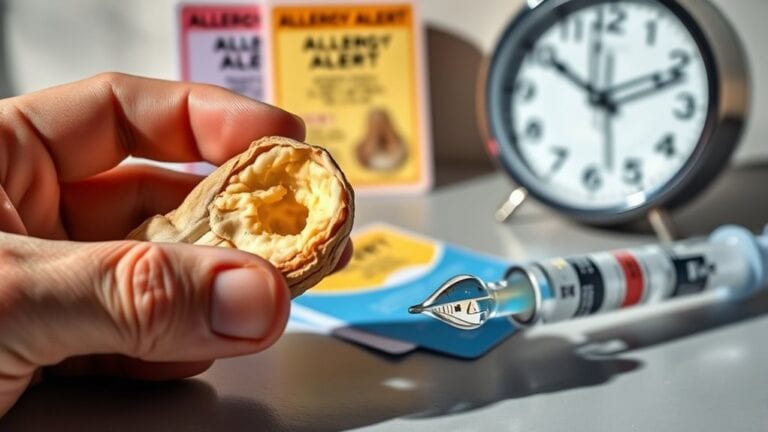Envision your blood as a bustling highway, and the MCHC blood test is the traffic report that helps you traverse it. This test discloses how much hemoglobin is packed into your red blood cells, illuminating your general well-being. Are you curious what your levels signify for you? Together, we can delve into the possible revelations this test provides and what they could reveal about your blood health.
What Is the MCHC Blood Test?
When you consider your health, you mightn’t recognize that a small test can uncover much about your red blood cells. The MCHC blood test, or Mean Corpuscular Hemoglobin Concentration, gauges the typical concentration of hemoglobin within your red blood cells (RBCs).
This test is part of the complete blood count (CBC) and assists in assessing your blood’s health. With typical MCHC levels ranging from 32 to 36 grams per deciliter (g/dL), it offers clarity into how effectively your blood is functioning.
Given that MCHC centers on hemoglobin concentration relative to RBC volume, it might aid in spotting potential concerns like anemia or nutritional deficiencies. Grasping this test can enable you to manage your health and wellness.
Understanding Normal and Abnormal MCHC Levels
The MCHC blood test results can offer valuable insight into your health, particularly regarding your red blood cells. Normal MCHC levels range from 32 to 36 g/dL, signaling ideal hemoglobin concentration.
In case your levels fall below 32 g/dL, you could be facing low MCHC, frequently associated with iron deficiency anemia, chronic illness, or thalassemia.
Conversely, elevated MCHC values exceeding 36 g/dL may indicate hereditary spherocytosis, dehydration, or hemolytic anemia. Irregular MCHC levels can assist in categorizing types of anemia when evaluated alongside MCV and RDW.
Should you discover abnormal levels, don’t worry; it typically suggests additional testing, such as iron studies or a peripheral smear, is required to uncover the root cause.
Causes of Low MCHC and Their Implications
While you may not consider much about your blood test results, low MCHC levels can reveal a lot about your general health and wellness.
The most common cause is iron deficiency anemia, where insufficient iron hinders hemoglobin production in your red blood cells.
Chronic inflammatory diseases like rheumatoid arthritis can also lower MCHC through disrupting iron metabolism.
Should you have thalassemia, a genetic disorder, your ability to form red blood cells is affected, leading to low MCHC.
Kidney disease reduces erythropoietin production, which results in fewer red blood cells over time.
Causes of High MCHC and Related Conditions
High MCHC levels in a blood test can often raise concerns, especially provided you’re unfamiliar with what that means for your health. Grasping the causes of high MCHC is essential, as it can indicate issues like dehydration, certain blood disorders, or even hereditary conditions. Heightened corpuscular hemoglobin concentration might contribute to symptoms of anemia as well.
Here’s a quick overview of some causes:
| Cause | Related Condition | Remarks |
|---|---|---|
| Dehydration | Increased viscosity | Can lead to false high results |
| Spherocytosis | Hemolytic anemia | Genetic blood disorder |
| Cold agglutinin disease | Autoimmune conditions | Body reacts to cold |
| Liver disease | Blood abnormalities | Affects blood cell production |
| Hemoglobinopathies | Various blood disorders | Genetic variations lead to high MCHC |
Always consult your healthcare provider for personalized advice based on your test results.
What to Expect During an MCHC Blood Test
Anticipating an MCHC blood test could seem a bit overwhelming, but grasping what to expect can make the process much easier. This common blood test is typically part of a complete blood count (CBC) and involves drawing a small blood sample from a vein in your arm. No special preparation is needed unless other tests are ordered.
During the blood draw, you may feel a slight pinch as the needle goes in, but the procedure usually takes under five minutes. Once the sample is taken, it’s sent off for analysis to measure hemoglobin concentration relative to red blood cell (RBC) volume.
You can expect results in 24–48 hours, which will be interpreted alongside other CBC indices.
Next Steps After Receiving Your MCHC Results
Receiving your MCHC results can feel like a mixed bag of emotions, but comprehending what steps to take next can truly assist you in navigating the path ahead. Should your levels be low, your doctor might suggest requesting a CBC or iron studies to confirm iron deficiency anemia. You could consider examining your dietary habits, aiming to incorporate more iron-rich foods. Should MCHC be high, it’s prudent to consult a hematologist to investigate potential blood cell disorders.
| Situation | Next Steps |
|---|---|
| Low MCHC levels | Order CBC or iron studies |
| High MCHC levels | Consult a hematologist |
| Nutritional deficiencies | Examine dietary habits |
| Elevated hydration | Monitor hydration status |
| Persistent issues | Address root causes |
Following these steps can help you manage your blood health effectively.





